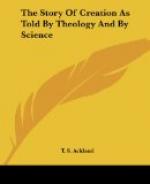We come now to the consideration of the origin of man, which Mr. Darwin, in his last work, ascribes also to natural and sexual selection. His view is, that man is descended from some family of anthropomorphous apes, and that all those enormous differences which, as he admits, exist between the highest ape and the most degraded member of the human race, are differences of degree only, and not of kind; that all our intellectual wealth, and all our moral laws, are simply the development of faculties and ideas which were possessed in a ruder form by the creatures from whom man is descended.
So far as man’s physical constitution is concerned, there is undoubtedly something to be said in favour of this view. For man’s bodily frame is composed of the same elements, and moulded upon the same general plan as that of the higher apes, and, what is still more remarkable, it retains, in a rudimentary form, certain muscles and organs which are fully developed and answer important purposes in many of the quadrumana. Of these the tail is a remarkable instance. But when the differences between the physical peculiarities of man, and those of his supposed progenitors are examined, the theory of natural selection collapses entirely, for the development has taken the form which would be most disadvantageous in the struggle of life. This is very clearly put by the Duke of Argyll.[Footnote: “Recent Speculations on Primeval Man,” in Good Words, April, 1868.]
“The unclothed and unprotected condition of the human body, its comparative slowness of foot; the absence of teeth adapted for prehension or for defence; the same want of power for similar purposes in the hands and fingers; the bluntness of the sense of smell, so as to render it useless for the detection of prey which is concealed;—all these are features which stand in fixed and harmonious relation to the mental powers of man. But, apart from these, they would place him at an immense disadvantage in the struggle for existence. This, therefore, is not the direction in which the blind forces of selection could ever work .... Man must have had human proportions of mind before he could afford to lose bestial proportions of body.”
But it is in the intellectual and spiritual part of man’s nature that the greatest difficulty in the way of the application of these theories arises. The strongest argument of all against them is one which is incapable of proof, since it arises not from facts around us, but from our own self-consciousness—our realization of our own powers—and so, to each individual man it must vary in apparent strength, in proportion as he realizes what he is, and what it is in his power to become. The very outcry that has been raised against Mr. Darwin’s proposition is a proof of this. The theory of the descent of man, as he propounds it, was felt to be an outrage upon the universal instincts of humanity. But, because this objection rests upon such a foundation, it is incapable of being duly weighed and investigated as an argument, and we proceed therefore to such considerations as are within our reach.




